Ahoy, squirts! Quint here with a really nice chat with screen legend Angie Dickinson, who recently came through Austin as part of TCM’s touring vintage film series to screen Rio Bravo. When the chance to speak with her came up I couldn’t turn it down. Just couldn’t.
I was a little intimidated by Beaks’ great AICN Legends interview with her a few months back, but then I came to my senses, realizing I could focus on Howard Hawks’ classic Rio Bravo and get a chance to meet one of cinema’s walking talking icons.
The only problem with this interview is that Ms. Dickinson is so sweet, so frank and so interesting that my 20-something minute interview barely feels like the first sentence of a book. This is a lady I could talk shop with for hours and still not feel like we’ve covered all the bases.
What is here is great stuff. And there’s a bit of a cameo appearance by TCM’s Ben Mankiewicz, who was in the room with us. I got to spend some time with Ben before Ms. Dickinson got there and found him to be a real deal cinemaphile and cool guy.
Here’s the interview… in which Ms. Dickinson talks about her working relationship with John Wayne, Howard Hawks, “Sammy” Fuller and how great Point Blank is “until they fucked up the ending.” Her words. I wasn’t bullshitting you guys earlier… she’s kind of awesome. And by kind of I mean totally. As you’ll soon see.
I’ve included a bit at the end where much of this is talked about, conversation spurned on by my inability to be a professional. You’ll see what I mean.
Ms. Dickinson began by commenting on a shot of her from Rio Bravo that TCM used on their advertising, the poster occupying the room with us. She was in the outfit seen in the below still:
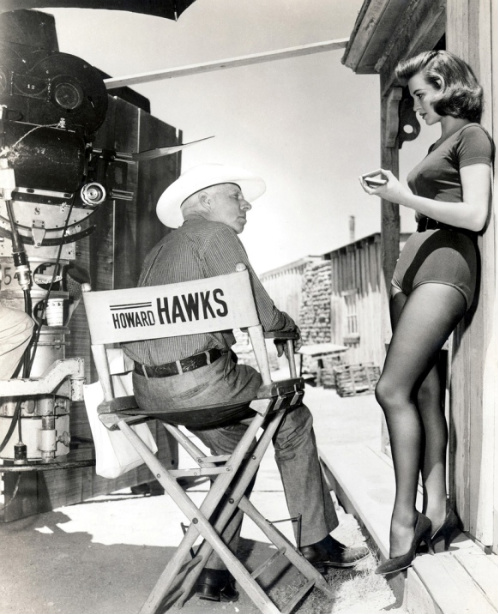
Angie Dickinson: What a nice picture they chose. That’s from RIO BRAVO.
Quint: Yep.
Ben Mankiewicz: But it’s all contemporary clothes there, that’s what threw me off.
Angie Dickinson: It was a leotard. Dancers were always in leotards and, as we know, certain things only worked in the barbershop or in the bars… Hookers on the street every day now. It’s really bad.
Ben Mankiewicz: Whores, please. We prefer “whores.”
Quint: You did a great interview for PRETTY MADS ALL IN A ROW with one of our guys.
Angie Dickinson: Who was that?
Quint: Jeremy Smith.
Angie Dickinson: I can’t recall that particular one, because I did quite a few, but I enjoyed doing that, because it’s such an oddball movie, so it brought out all of the questions that otherwise wouldn’t be asked. (laughs)
Quint: It was one of the best interviews that I’ve seen from Jeremy. I think he was smitten. I think you could have wrapped him around your finger if you wanted to.
Angie Dickinson: On the phone that’s not hard to do. Thank you so much.
Quint: I love PRETTY MAIDS ALL IN A ROW. I saw it because Quentin Tarantino actually brought it to Austin like a long, long time ago.
Angie Dickinson: Did he?
Quint: He owns a print. He’s known for bringing these vintage films to Austin and running a festival of his prints. That was the first time I had even heard of the movie.
Angie Dickinson: Is he from here?
Quint: No, I think he’s from Tennessee, but there’s a big film loving community in Austin and I think he was drawn to it.
Angie Dickinson: And he’s such a specialist. He loves RIO BRAVO, you know that?
Quint: Who doesn’t love RIO BRAVO?
Angie Dickinson: I think it’s even in his bio that he used to not date a girl until he found out if she liked RIO BRAVO. (laughs)
Ben Mankewicz: I’ve seen him out in restaurants too often to know that that couldn’t possibly be true. There’s no way he put those girls through that test!
Angie Dickinson: He could manage just fine on his own.
Ben Mankewicz: Last time I saw him he had two girls with him. I don’t think he was putting them through that test, but maybe. I don’t know.
Angie Dickinson: Or they certainly passed. (laughs) I saw him on Tavis Smiley and Tavis is so bright and does a different kind of interview and my God Quentin is bright. I mean that’s a given and then you go to odd, weird, special, fantastic… I loved BASTERDS so much.
Quint: That’s such a fantastic film. The dude’s a movie encyclopedia. I’ve had a lot of conversations with him just because over the years he’s done so many events here and it’s almost like a little community of the same people have formed around his festival. You could throw anything at him in conversation, the most obscure movie, and he will have a story about it. He will know it, he’ll know the year and everything. It’s almost like an awesome genius form of autism.
Angie Dickinson: Like Michael Feinstein can do any song you have ever heard. He can not only play it, he’ll know the lyrics and he will know the history. It’s almost that “Whoa!” But that sounds like Santa Barbara Festival… They are a party now, it’s a social event, so you must have that all of the time.
Quint: I’ve been to the Santa Barbara Film Festival a few times.
Angie Dickinson: Is it somewhat like what you are talking about?
Quint: A little bit. Listen, I liked going to film festivals to see good movies and their programming is about the eighth thing that’s most important to them, so it’s kind of a frustrating thing for a move fan, because I’d be out there for ten days and the big events are great, but I go to film festivals for the movies…
Angie Dickinson: Telluride is like that.
Quint: There are so many things I could ask you. I could talk your ear off for two hours about your career.
Angie Dickinson: Do, I don’t mind.
Quint: Oh, but they will! The publicists will mind a lot! (laughs). I figured since you are here for RIO BRAVO, it’d probably be good to focus on that. To me what’s really interesting and what I love about your performance and how the character is written, I just love how it’s not a typical female character, especially for that time. The moment that that strikes me is when Duke accuses you of being a cardsharp, of cheating at poker.
Angie Dickinson: Yeah, and follows up after the missing cards.
Quint: And you are a woman poker player and you are doing well, so obviously you’re cheating. And in almost any other movie I can think that would have been your character. You would have been the ex of the criminal and all of this stuff, but then they do something really smart and they make someone else the cheater and your character is completely innocent. So from the very first time that you confront Duke you are on a higher level than he is.
Angie Dickinson: I got wrongly accused, yeah. And also when you can prove it, “Search me.” Then I’ve got him.
Ben Mankiewicz: There’s also a, if I may, there’s a coolness in the initial confrontation which is almost where I think the real balls are and where you know what kind of character this is. Like yeah you get that confrontation of “Search me,” where you stand up to John Wayne, but even when he brings it up and you admit “Well yeah, that’s me” and he says “Where’s Feathers?” There’s no sweating. There’s no nothing.
Angie Dickinson: That came from Hawks.
Ben Mankiewicz: Oh, it did? You are unmoved. There’s just a coolness right away that tells the audience “No chance that she’s going to get flustered.”
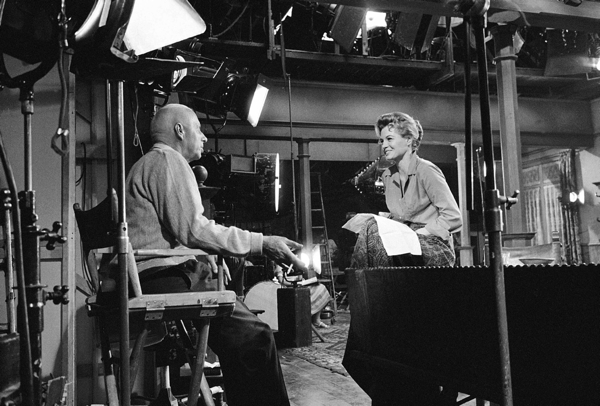
Angie Dickinson: Yeah, and it’s so well established right off that “This woman ain’t going to go down easy” and he is just about as taken aback as an ordinary audience, again especially at that time… The sixties hadn’t come yet. (laughs)
Quint: From the very beginning they set up Wayne as unshakable. Even when he gets his head bashed in at the beginning, he still shows up stronger than everybody in the room two minutes later. However, the first time that he shows any sort of weakness or the feeling that he’s out of his element is when he meets your character.
Angie Dickinson: And that’s all part of the build up. That’s called great writing.
Quint: And it’s not silly. If somebody tried it today, I could see that becoming silly where suddenly a tough guy is flustered around a pretty woman, but that’s not how Wayne played it. He was so sure and he shows up confident and he’s like “I’ve seen this a million times, I’m going to find you out.” With that “Search me” moment you completely take him out of his comfort zone.
Angie Dickinson: And he also… With a guy he would know what to say. He would say “Well, don’t ever come back again.” And “Sorry I mistook you, but you sure looked guilty to me, just get out of town.” That would have been his MO, but… (Laughs) with a woman he doesn’t know what to do! “Oh gee, well… I guess you better leave.” He all but had the ticket in his hand to say “It’s on us, but get out…” It’s a wonderful setup.
Speaking of Quentin Tarantino, it reminds me of the fantastic opening scene with the Nazi hunter and the farmer, it’s just… I’ve never seen an opening scene that length with not much happening in my life, so quietly done, yet establishing everything.
Quint: And hypnotic. You are so drawn in by the French actor, you’re drawn in by Christoph [Waltz]…
Angie Dickinson: Just for a side, I had heard about Christoph because he had won the Cannes Film Festival and when I saw the movie I did not know who he was or what he was, I didn’t know he was the Nazi hunter or anything and the other guy, the farmer, was so good I thought that might be Christoph. I still didn’t know. He was just great.
Ben Mankiewicz: I love a scene that terrifying with no gun, no weapon, no threat of…
Angie Dickinson: Just camera images and time.
Ben Mankiewicz: Right, time and pauses.
Angie Dickinson: Yeah, no rush to make a statement.
Quint: It’s a threatening understated conversation.
Ben Mankiewicz: And the lack of conversation is my favorite scene of a Hitchcock movie is the end of NOTORIOUS.
Angie Dickinson: The best, but I don’t recall what scene you mean now.
Ben Mankiewicz: I just mean when he’s carrying her down the stairs and it’s just “Is anyone going to say anything?”
Angie Dickinson: No. But to be able, not to have the balls, but to be able to structurally, see what the whole thing means and get away with it. When I did DRESSED TO KILL there were about ten pages of what I’m thinking and this is narration if necessary…
Quint: Is that the museum scene?
Angie Dickinson: Yes, and so a couple of months after Brian (De Palma) calls and I said “So when are we going to do the narration?” He says, (in a sing-song voice) “We don’t need it!” (Laughs) And that’s how he told me. He was just so happy. So it’s rare that it can work, but even in CASABLANCA the quiet buildup is not quite so extreme, but very unorthodox at that time I think.
Quint: I think you’re right. I know the studios was kind of scared of CASABLANCA, weren’t they? Wasn’t that a movie that was on the shelf for a while?
Angie Dickinson: I doubt if it was on the shelf for a while, because I think they had to get them out, but I think they just didn’t give much thought to it. I don’t really know that answer.
Quint: When I think of CASABLANCA, even though it’s filled with such amazing star power in the lead roles, for whatever reason I think Peter Lorre first. He was my entry into that and he’s in the movie for three minutes.
Angie Dickinson: But look at what they establish. He’s such a great actor and it’s again the writing, so you’re already sympathetic, you already know all about Rick…
Quint: That’s the thing, using that character you know everything you need to know about your lead via a supporting player. “I stick my neck out for no one.”
Angie Dickinson: That’s right.
Quint: You know that, you know his stance and then so it has such an impact when he actually does.
Angie Dickinson: Exactly. It’s brilliant.
Ben Mankiewicz: But, he also takes them you know.
Angie Dickinson: What do you mean, “he takes them?”
Ben Mankiewicz: He takes the letters of transit.
Angie Dickinson: Oh, yeah.
Quint: You’re not sure what he’s going to do.
Ben Mankiewicz: Right, you don’t know, so I mean he does stick his neck out, but it establishes…
Angie Dickinson: His side at least, (laughs) who’s side he’s on.
Ben Mankiewicz: Right and you know it’s Bogart, so you know he ain’t on the Nazi’s side. We know that’s not going to happen.
Quint: But he could be on his side.
Ben Mankiewicz: He could be on his side, right. You don’t know. It’s a great moment.
Quint: I don’t think you even share any scenes with him in RIO BRAVO, but Walter Brennan is kind of my Peter Lorre for that movie.
Angie Dickinson: That’s an interesting take.
Quint: His relationship with Duke, throughout the whole film, kind of gives the character a softness. Moreso even than his scenes with you in a very odd way.
Angie Dickinson: That’s absolutely true. He doesn’t get soft with me ever, except that night where he has the drink at the bar and starts to soften up, but yeah Brennan is so brilliant in that. When he almost shoots Dean, it’s very… You cry for him, because he was so shaken up and all of the things that follow. “He was just trying to take care of you…” The camaraderie between the two is just wonderful.
Quint: I’m right in that you don’t share a scene with him, right?
Angie Dickinson: That’s correct. We sat around the set a bit, but you know there’s not much sitting around the set in Tuscon when it’s 125 degrees. So since we had no scenes together he wouldn’t come to the set when I was working and I wouldn’t go to the set when he was working. You just don’t have that much time on your hands to kill, so I just had a few opportunities out on the set. Hawks did have everybody there all of the time, if you were at all remotely related to the scene, in case he wanted to throw somebody in the background or whatever. I really adored (Brennan), but did not get much of a chance to get to know him.
Quint: How about Hawks himself? He’s obviously one of the legendary directors and you have worked with many legendary directors.
Angie Dickinson: Up till then I hadn’t, though. Sam Fuller was before that. I did CHINA GATE before I did Rio Bravo. Sammy was the antithesis of Howard Hawks.
Quint: Really?
Angie Dickinson: He would tell you exactly what to do, which I love. Hawks was difficult for me, because I was so green. I was only four years in the whole business, the entertainment business or anything other than a moviegoer, so I loved it when they said “And then you laugh, and then you cry, then you go out the door.” Perfect!
Quint: So you didn’t have to worry about it, as long as you could deliver what they wanted…
Angie Dickinson: With Sammy I didn’t have to worry about it, but Hawks was tough, because he would not really tell you what to do. He would just sort of get around to what he was after, because, and I finally analyzed it, if he told you what to do it wouldn’t come from you, so he had to make you, through osmosis, do what he had in mind, but not specifically.
Quint: That takes a lot of confidence on his part as a director because if he was not as confident in his choice of actors, if he wasn’t as confident in his abilities as a filmmaker, then I think he would for sure dictate what you wanted to do.
Angie Dickinson: I’ve got pictures of him talking with me and I’m standing with the script and here the crew are like this [stares off, patiently] and that’s the picture, they are all just waiting. Well you don’t do that anymore either, it’s just too expensive. It isn’t as though we rehearsed for a month, as a few directors get to do. He took his time on the set when he had you and he was a slow talker anyway. Have you ever seen a film on him or anything?
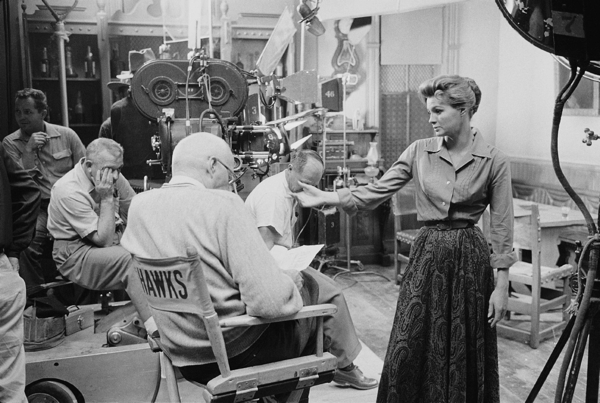
Quint: Just a little bit, yeah. Mostly through these guys, TCM. (Laughs)
Angie Dickinson: Very deliberate.
Ben Menkiewicz: Which is really ironic when you watch HIS GIRL FRIDAY or something like that.
Angie Dickinson: Oh yeah, or me going at it or BRINGING UP BABY. Yes, it’s so odd. And he’s a Gemini, and they are usually talkers, but he really, really talked very, very slowly.
Quint: It actually surprises me a little bit that he would give you so much freedom in his direction of you, because the movie feels very specific. It feels like one of those films where beat to beat to beat everything is set up from the get go.
Angie Dickinson: Doesn’t that come from the script? That’s a great script. I’m sure he worked on it with them, so it’s the director and script, where does one stop and the other (begin?) It’s rare, but it worked didn’t it? He didn’t have Cary Grant with me. He didn’t direct Duke much.
Quint: (Laughs) I imagine.
Angie Dickinson: I don’t think so, not in our scenes, and I thought “Shit, it’s all on me!” Duke always somewhat played the same role…
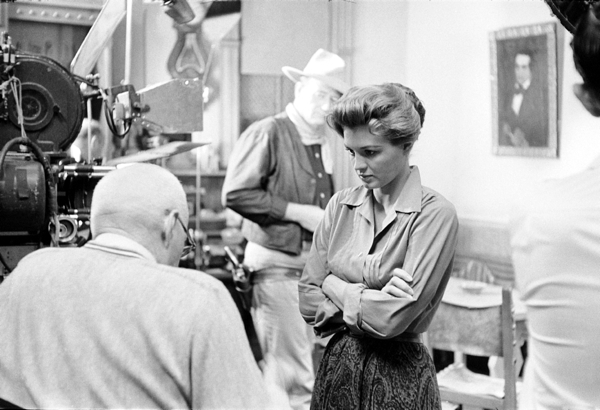
Ben Mankiewicz: Guys can I ask a question? I’m sorry, Eric…
Quint: No, please.
Ben Mankiewicz: There’s a wonderful show on FX called JUSTIFIED about a US Marshall... it’s one of the best shows on television and they frequently never point their guns, they disarm people without guns and they often find themselves in similar situations of a lot of bad guys and just him and they talk their way out of it, much like Dean and Duke do here, but I’m curious why in many of these situations, like in the bar for example, they never point their guns at these guys ever, they are down and just holding them at the side, which I think totally tells the audience right away that these guys are confident. Do you remember anything about that? Does that come from direction? Is that a decision made by them?
Angie Dickinson: You’re talking mostly, of course, the bar scene where they are looking for the guy with the muddy boots?
Ben Mankiewicz: Right, but even when Wayne comes in to get Joe the first time, he doesn’t come in… Nobody is coming in like “You’re under arrest,” they just walk in with guns at the side, it’s pointed at the floor.
Angie Dickinson: I have a feeling that it was the day of carrying guns and they became like a third arm and they weren’t at the ready constantly, they’d get a back ache.
Ben Mankiewicz: I think it’s unique to RIO BRAVO. I mean, I’d have to think about that.
Angie Dickinson: On POLICE WOMAN you could not have photographed the gun and the head at the same time.
Ben Mankiewicz: Is that right?
Angie Dickinson: Yeah, that was a code. That was the rule. So you could show a shot of me right at the head and your head is just off screen and then your head, but you could not show the two. Now getting to that, I’m not sure if there were such a code for movies, you would probably know that.
Quint: There could have been, but I see what Ben’s saying. In most westerns you will have somebody walking into a bar with the guns up and ready.
Angie Dickinson: I think certainly RIO BRAVO, a type of movie where “Hey, we’re cool…” and that was a new attitude as opposed to the Hopalong Cassidy days of “Let’s go get them!” I know what you are saying and RIO BRAVO being John Wayne and being such a good movie, we pay more attention to it. It may have been with many others at the time, but I don’t really know the answer. Interesting, I will certainly be watching. I want to watch RED RIVER again to see if it’s indigenous to Hawks or Wayne.
Quint: RED RIVER is actually screening here tomorrow night.
Angie Dickinson: (Whispering) We should stick around, it’s wonderful.
Quint: Yeah!
Angie Dickinson: You know, I’m not staying tonight because the audience is uncomfortable when the actor is there, you laugh harder when it’s funny and I don’t think it’s fair to the audience.
Quint: I don’t know, as an audience member it always kind of gets a little buzz going, especially for a classic movie.
Angie Dickinson: Well, I think it throws their attention off.
Ben Mankiewicz: Also, how many times have you seen it?
Angie Dickinson: (Laughs) Well, that (is the other reason). I love the movie. I just love it. If I have to close, if I see it on and I turn it on, I’m dead, so I simply cannot turn it on because I can’t turn it off. It’s just so infectious. It’s a delicious movie.
Quint: It’s so beautifully shot and like I said it’s almost hypnotic, that opening bit without any dialogue… If you see the opening, you have to watch everything.
Angie Dickinson: I read where (cinematographer) Russell Harlan… I did not realize this until (recently) that Russell did TO KILL A MOCKINGBIRD.
Quint: Really?
Angie Dickinson: I never knew that. We were ’58 and that was ’63 or ’62 I guess, shot in ’62 and… that’s right, because he got the award in ’63… That’s a cameraman! (laughs)
Quint: Well, thank you so much for your time.
Angie Dickinson: Thank you, Eric!
Quint: Like I said, if I could sit you down for a day to talk about this stuff I would.
Angie Dickinson: I would not move!
Quint: I would not let you get a moment’s rest. I hate being that guy, but could you sign something for me?
Angie Dickinson: Of course.
Quint: I have to because I’ve had this lobby card for a while.
Angie Dickinson: It’s my pleasure.
Quint: It’s another favorite performance of yours, so…
Angie Dickinson: This is the (part) where he says “So what about…” and she says “I’ll get him for you” and I walked away. I love it and that was (director John) Boorman, just a throw away “I’ll get him for you.” It’s a wonderful movie.
Quint: I love the sound design in that movie is incredible too; the scene of him running and the footsteps being kind of off sync.
Angie Dickinson: In the airport? Oh God, it’s one of the great scenes. It’s Boorman. That was his second movie.
Quint: Yeah, he was very fresh.
Angie Dickinson: And he was wonderful. They did fuck up the end.
Ben Mankiewicz: They did.
Angie Dickinson: They really did. That was not the original script and they screwed it up.
Ben Mankiewicz: Really?
Angie Dickinson: If you aren’t aware, I’ll fill you in…
Ben Mankiewicz: I’ve read how much Boorman hates it, but I’m one of the few… I really like the remake (PAYBACK). I do. I think it’s good and I especially like the director’s cut of the remake.
Angie Dickinson: The Mel Gibson thing? I didn’t like it either.
Ben Mankiewicz: What’s interesting is see the director’s cut, because they took it away from him completely for the last two weeks.
Angie Dickinson: Was that Brian (Helgeland)?
Ben Mankiewicz: Yeah, he didn’t even finish shooting it.
Quint: That’s the one where you were originally the voice on the phone?
Angie Dickinson: Yeah.
Ben Mankiewicz: They took Kris Kristofferson in and made him the villain. You’re actually in the director’s cut.
Angie Dickinson: They put it back in?
Ben Mankiewicz: Yeah, you should definitely see it.
Quint: It’s a much stronger movie.
Angie Dickinson: I will check the director’s cut, but Brian had a real… He couldn’t move Mel, I think. I’m not sure if they got along.
Ben Mankiewicz: Anyway, I thought it came out in the end, because I didn’t know any of that of course when I saw it and I hadn’t seen POINT BLANK at that point.
Angie Dickinson: Okay, so you could judge it not as a remake.
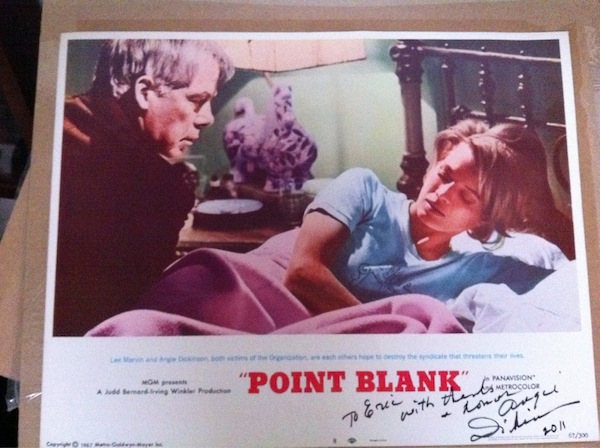
The conversation ended there, a good 10 minutes after the publicist tried to end it and was politely turned away by Ms. Dickinson. I love that she seemed more excited about talking about other movies, from Inglourious Basterds to Casablanca, than she was her own.
Hope you guys dug the interview as much as I did!
-Quint
quint@aintitcool.com
Follow Me On Twitter

